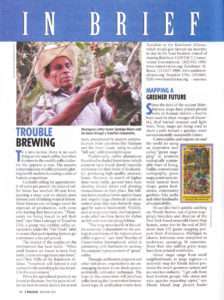By Sofia Perez
[Published by E: The Environmental Magazine, May/June 2002]
 To a java junkie, there is no such thing as too much coffee, but when it comes to the world’s coffee industry, the opposite is true. The massive overproduction of coffee presently glutting world markets is causing a crisis of historic proportions.
To a java junkie, there is no such thing as too much coffee, but when it comes to the world’s coffee industry, the opposite is true. The massive overproduction of coffee presently glutting world markets is causing a crisis of historic proportions.
Currently selling for approximately 45 cents per pound, the price of coffee beans has reached 30-year lows, exacting a steep cost on already poor farmers and shrinking tropical forests. Many farmers can no longer cover the expenses of production, with some even leaving their beans to rot. “Thousands are being forced to sell their land,” says Nina Luttinger of TransFair USA, a group that certifies coffee cooperatives under the “Fair Trade” label to ensure that participating farmers get a minimum price per pound.
The impact of the surplus on the environment has been harsh. “When small farmers are forced to leave their lands, it does not regenerate into forest,” says Chris Wille of the Rainforest Alliance. “Somebody will deforest it and replace it with something far less friendly to the environment.”
Prices for agricultural products are bound to fluctuate, but the price of coffee has been in steady decline for several years, precipitated by massive overproduction from countries like Vietnam and the Ivory Coast, using so-called “full-sun” cultivation techniques.
Traditionally, coffee plantations flourished in shaded forest areas (which scientists have found closely resemble rainforests for their levels of biodiversity), producing high-quality, aromatic beans. However, in search of higher short-term yields, growers have been clearing shaded farms and planting monocultures in their place. But full-sun farms produce lower-quality beans and require large chemical inputs to control pests that were formerly managed by natural biodiversity. Wildlife, such as migratory birds that had previously relied on these farms for shelter are left with ever-shrinking habitat.
“The long-term health of the coffee economy is dependent on the ecological conditions of the regions where coffee is grown,” says Amy Skoczlas of Conservation International, which is partnering with Starbucks to increase the company’s procurement of “green” coffee.
Through certification programs and other initiatives, organizations are encouraging farmers to use shade-grown, ecofriendly cultivation techniques. The hope is that consumers will purchase coffee bearing the Conservation International logo, or certification marks from TransFair or the Rainforest Alliance, which would give farmers an incentive to stay in the bean business instead of clearing their land.
CONTACT: Conservation International, (202)912-1000, www.conservation.org; Rainforest Alliance, (212)677-1900, www.rainforest-alliance.org; TransFair USA, (510)663-5260, www.transfairusa.org.


